九年级英语上册unit3Topic 1知识点汇总仁爱版
- 格式:docx
- 大小:16.70 KB
- 文档页数:6

Unit 1 Topic 1I. 重点词组1.take photos 照相2.learn…from…向……学习3.in detail 详细地4.in order to为了5.give support to…为……提供帮助6.see sth. oneself 亲眼所见某物7.keep in touch with 与……保持联系8.sorts of各种各样的9.make progress 取得进步10.draw up 起草,拟定11.thanks to 由于II.重点句型1. In one place I saw children working for a cruel boss.在一处我看到了孩子们为残忍的老板干活。
2. I felt sorry for them.我对他们深表同情。
3. Where have you been, Jane? 你去过哪里,简?4. She has gone to Cuba to be a volunteer.她去古巴当志愿者了。
5. There goes the bell. 铃响了。
6. Though I had no time to travel, I still felt very happy.虽然我没有时间去旅行,但是我仍然感到很开心。
7. Now our country has developed rapidly.现在我们国家发展迅速。
III.语法1. 现在完成时态的构成:助动词have/has+动词的过去分词e.g. You have just come back from your hometown.2. 现在完成时态的句式:e.g. (1) I have been to Mount Huang with my parents.(2) I haven’t seen him for a long time.(3) Where have you been?(4) ——Have you ever cleaned a room? ——Yes, I have. / No, I haven’t.3. have/ has been与 have/has gone 的区别have/has been to sp.表示曾经到过某地—— have/has gone to sp.表示已经去了某地e.g. (1) I have been to Mount Huang with my parents. (2) She has gone to Cuba to be a volunteer.Unit 1 Topic 2I. 重点词组1. get lost 迷路2. each other 彼此3.at least 至少4take place发生5because of 因为6.be strict with sb. 对某人严格要求7.carry out 实行8.be short of 缺乏9.take measures to do sth.采取措施做某事10.be known as…作为……而著名11.work well in doing…在……方面起作用12.a couple of 一些13keep up with赶上,跟上II.重点句型1. Have you found him yet? 你已经找到他了吗?2. ——I really hate to go shopping. 我的确讨厌购物。
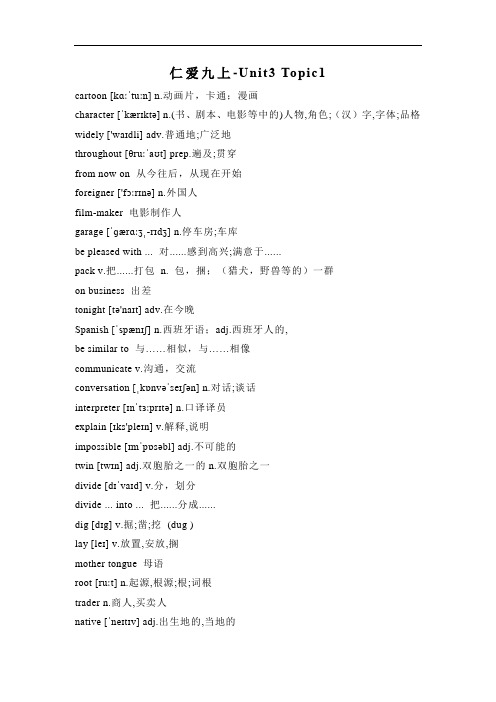
仁爱九上-Unit3 Topic1cartoon [kɑːˈtuːn] n.动画片,卡通;漫画character [ˈkærɪktə] n.(书、剧本、电影等中的)人物,角色;(汉)字,字体;品格widely ['waɪdli] adv.普通地;广泛地throughout [θruːˈaʊt] prep.遍及;贯穿from now on 从今往后,从现在开始foreigner ['fɔːrɪnə] n.外国人film-maker 电影制作人garage [ˈɡærɑːʒˌ-rɪdʒ] n.停车房;车库be pleased with ... 对......感到高兴;满意于......pack v.把......打包n. 包,捆;(猎犬,野兽等的)一群on business 出差tonight [tə'naɪt] adv.在今晚Spanish [ˈspænɪʃ] n.西班牙语;adj.西班牙人的,be similar to 与……相似,与……相像communicate v.沟通,交流conversation [ˌkɒnvəˈseɪʃən] n.对话;谈话interpreter [ɪnˈtɜːprɪtə] n.口译译员explain [ɪks'pleɪn] v.解释,说明impossible [ɪmˈpɒsəbl] adj.不可能的twin [twɪn] adj.双胞胎之一的n.双胞胎之一divide [dɪˈvaɪd] v.分,划分divide ... into ... 把......分成......dig [dɪg] v.掘;凿;挖(dug )lay [leɪ] v.放置,安放,搁mother tongue 母语root [ruːt] n.起源,根源;根;词根trader n.商人,买卖人native [ˈneɪtɪv] adj.出生地的,当地的speaker ['spiːkə] n.讲(某种语言)的人;发言人foreign adj. 外国的base n.根据;根基;总部v.以......为基础(或根据) European [jʊərəˈpiːən] adj.欧洲的kingdom [ˈkɪŋdəm] n.王国;管辖范围;领域tourism [ˈtʊərɪz(ə)m] n.路、旅游业;观光conference [ˈkɒnFərəns] n.(正式的)会议;商谈tourist n.旅游者,游客Britain ['brɪtən] n.英国;不列颠powerful [ˈpaʊəfʊl] adj.强大的;有权势的;有影响力的leading [ˈliːdɪŋ] adj.最重要的,最成功的position [pəˈzɪʃ(ə)n] n.位置;方位知识梳理【重点短语】1.stick…on… 把……粘在……上2.stick to doing sth. 坚持做某事3.can’t wait to do sth. 迫不及待做某事4.practice doing sth. 练习做某事5.throughout the world/all over the world/around the world 全世界6.be afraid of doing sth./be afraid to do sth. 害怕做某事7.from now on 从现在起8.be pleased/satisfied with 对……感到满意9.on business 出差10.the official language 官方语言11.be similar to 与……相似12.have (no/much) trouble/difficulty (in) doing sth.有(没有/很多)困难做某事13.have long conversations with sb.与某人进行长的对话14.if necessary 如果有必要的话15.ask sb. for help 向某人寻求帮助16.explain sth. to sb. 向某人解释某事17.wish sb.+n. 祝愿某人……18.mother tongue/language 母语19.the largest number of最多数量的……20.as well as和,又,和……一样好,既……又……21.It is clear that…… 很明显……22.English speakers 讲英语者23.go abroad 出国24.play an important part/role扮演重要的角色25.take the leading position占据领先地位26.encourage sb.to do sth.鼓励某人做某事27.be popular with…… 受……欢迎28.make progress in doing sth.在做某事方面取得进步29.be required to do sth. 被要求做某事30.be regarded as 被看做……31.the rest of 剩余的……32.divide…into… 把……分成……33.一般现在时被动语态结构式;am/is/are+动词过去分词【词形变化】1.wide adj.宽的,广泛的widely adv.普通的,广泛的2.foreign adj.外国的foreigner n.外国人3.explain v.解释,说明explanation n.说明,解释4.possible adj.可能的impossible adj.不可能的5.Europe n.欧洲European adj.欧洲的n.欧洲人6.tour n.旅游tourist n.游客tourism n.旅游业,观光重点句型:1.Disneyland is enjoyed by millions of people from all over the world. 迪士尼乐园被全世界数百万的人所喜欢。

Unit3 Topic1Section A1.You can stick it on the wall.你可以把它粘在墙上。
(1)stick(动词)粘贴,粘住Eg:Please stick this map of China on the wall.请把这张中国地图粘在墙上。
(2)stick(名词)木棒,木棍,枝条walking stick拐杖(3)stick to sth.坚持,坚守(某种观点、主张、理想、真理、协议)Eg:He always sticks to his own decision.他总是坚持他自己的决定。
(4)stick to doing sth.坚持做某事Eg:He sticks to speaking English every day.他坚持每天说英语。
2.Guess what!猜猜看!3.character人物,字体,性格特征4.Disneyland is enjoyed by millions of people from all over the world.世界上数百万的人都喜欢迪士尼乐园。
(1)is enjoyed被喜欢,是一般现在时的被动语态结构。
(2)by被(由)...,放在句子的后面,特别强调动作或行为的执行者。
5.I hope I can go there one day.我希望有朝一日能去那儿。
one day表示过去或将来的某一天,意为“(过去)有一天,(将来)有朝一日”。
Eg:One day you will understand.总有一天你会明白的。
One day a little monkey was playing by the river.有一天,一只小猴子在河边玩耍。
some day一般只表示将来的某一天,即“有朝一日,总有一天”。
Eg:Some day he will be famous.总有一天他会成名的。
6.Are you ready for your trip?你为旅行准备好了吗?(1)be ready for sth.为某事准备好Eg:The famous singer is ready for the concert.这个著名的歌手已经准备好演唱会。

九年级英语上册unit3Tpi 1知识点汇总仁爱版九年级英语上册unit3Tpi1知识点汇总仁爱版九年级英语上册unit3-4知识点仁爱版Unit3Tpi1贴在墙上stisthntheall来看一看eandhaveal为……做预备bereadfrsth预备做某事bereadtdsth迫不及待做某事an’taittdsth=an’thelpdingsth有机遇做某事haveahanetdsth练习做某事pratiedingsth能够做某事beabletdsth从此刻起,开始frnn设法做某事trne’sbesttdsth对…中意bepleasedith…besatisfiedith和…相似besiilart与…一样bethesaeas出差nbusiness把…翻译成translate…int整理包pane’sbag进行(一次)长谈havealngnversatin, havelngnversatins向…求助as…frhelp总的来讲,通常ingeneral=usuall费力做某事havetruble/diffiultiesdingsth偶然neinahile作为母语asthertngue/firstlanguage第二语言sendlanguage外语freignlanguage官方语言theffiiallanguage把。
分成divide…int……的总数/数量thenuberf……许多anuberf被普遍利用beidelused和某人交流uniateithsb这是事实It’struethat+处于领先地位taetheleadingpsitin鼓舞某人做某事enuragesbtdsth中国制造adeinhina把……看做,把…以为regard…as…也asellas即便eventhugh受。
欢迎beppularith在。
做得好dellin一样此刻时的被动语态英语语态有主动语态和被动语态两种。
主语是动作的执行者,叫主动语态。

1.现在完成时的用法:表示过去某一时间发生的动作或存在的状态,对现在仍有影响。
e.g. I have just posted the letter. 我刚把信邮寄了。
She has lost her watch. 她弄丢了手表。
2.现在完成时可以和不明确指出时间的状语连用,如already, yet,just,before, ever, lately, once等。
e.g. Have you heard from your friend lately?你最近收到你朋友的来信了吗?3.现在完成时也可以和包括现在在内的时间状语连用。
如this week, thismorning, today, thisyear等。
e.g. They have moved three times this year. 今年他们已经搬了三次家。
4.现在完成时不能和明确表示过去时间的状语连用。
如yesterday, last week, in 1999, two days ago,just now, when I came in等。
Unit 1-topic3现在完成时(Ⅲ)1.现在完成时表示从过去某一时刻延续到现在的动作或状态,常与for,since引导的状语连用。
for+一段时间,since+过去时间点或从句(从句的谓语动词用过去式)。
e.g. I have lived here for twenty years.我住在这里已有20年了。
We have built many factories since 1985.自1985年以来,我们建了许多工厂。
He has always helped me with my English since he came here.自从他到这里以后,他总是帮助我学习英语。
2.有的动词所表示的动作不是瞬间就可以完成的,要持续一段时间,这样的动词叫延续性动词。
不能延续下去的动词,叫非延续性动词或瞬间动词。

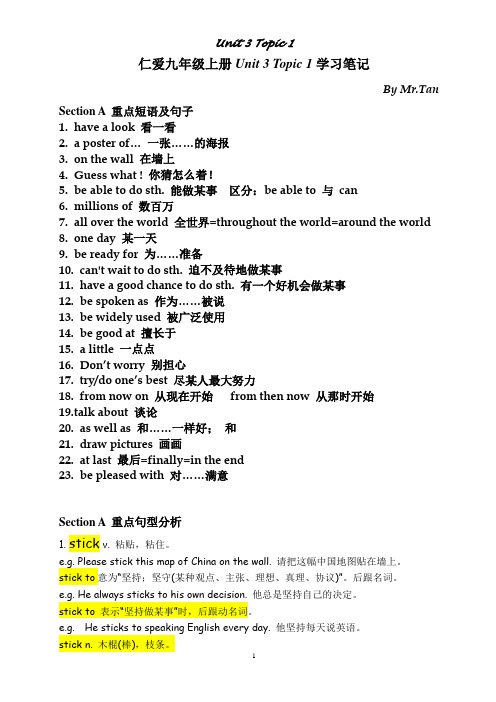
仁爱九年级上册Unit 3 Topic 1学习笔记By Mr.Tan Section A 重点短语及句子1.have a look 看一看2.a poster of…一张……的海报3.on the wall 在墙上4.Guess what ! 你猜怎么着!5.be able to do sth. 能做某事区分:be able to 与canlions of 数百万7.all over the world 全世界=throughout the world=around the world8.one day 某一天9.be ready for 为……准备10.can't wait to do sth. 迫不及待地做某事11.have a good chance to do sth. 有一个好机会做某事12.be spoken as 作为……被说13.be widely used 被广泛使用14.be good at 擅长于15.a little 一点点16.Don’t worry 别担心17.try/do one’s best 尽某人最大努力18.from now on 从现在开始from then now 从那时开始19.t alk about 谈论20.as well as 和……一样好;和21.draw pictures 画画22.at last 最后=finally=in the end23.be pleased with 对……满意Section A 重点句型分析1. stick v. 粘贴,粘住。
e.g. Please stick this map of China on the wall. 请把这幅中国地图贴在墙上。
stick to意为“坚持;坚守(某种观点、主张、理想、真理、协议)”。
后跟名词。
e.g. He always sticks to his own decision. 他总是坚持自己的决定。
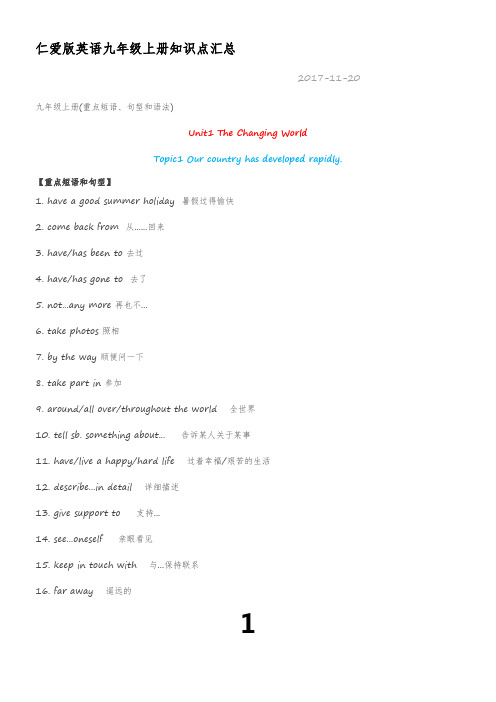
仁爱版英语九年级上册知识点汇总2017-11-20九年级上册(重点短语、句型和语法)Unit1 The Changing WorldTopic1 Our country has developed rapidly.【重点短语和句型】1. have a good summer holiday 暑假过得愉快2. come back from 从......回来3. have/has been to 去过4. have/has gone to 去了5. not...any more 再也不...6. take photos 照相7. by the way 顺便问一下8. take part in 参加9. around/all over/throughout the world 全世界10. tell sb. something about... 告诉某人关于某事11. have/live a happy/hard life 过着幸福/艰苦的生活12. describe...in detail 详细描述13. give support to 支持...14. see...oneself 亲眼看见15. keep in touch with 与...保持联系16. far away 遥远的117. kinds/sorts of 各种各样的...18. not only...but also 不仅...而且...19. make progress 取得进步20. more than/over 多于21. develop/improve rapidly 迅速发展/改善22. tell sb. (not ) to do sth. 告诉某人(别)做某事23. ask sb. (not ) to do sth. 要求某人(别)做某事24. in order to do sth. 为了做某事25. have to do sth. 不得不做某事26. It's +形容词+for sb. to do sth. 对于某人来说做某事是...的27. why not do sth.=why don’t you do sth为什么不做某事28. succeed/be successful in doing sth. 成功地做某事29. dream about doing sth. 梦想做某事30. see/hear sb. do/doing sth. 看见/听见某人做/正在做某事【重点语法】现在完成时一. 现在完成时的基本结构肯定句:主语+have/has+Ved (动词的过去分词)+其他否定句:主语+have/has+not+Ved (动词的过去分词)+其他一般疑问句:Have/Has+主语+Ved (动词的过去分词)+其他特殊疑问句:特殊疑问词+一般疑问句语序(have/has+主语+过去分词+其他),把划线词去掉二. 现在完成时的用法2影响现在还存在,强调的是现在。

九年级英语上册知识点归纳Unit 3(仁爱版英语)九年级英语上册知识点归纳Unit 3(仁爱版英语)Unit 3 Topic1 一. 重点词语 1.be able to=can 能够,会 2.can ’ t wait to do sth. 迫不急待地做某事 3.havea (good) chance to do sth. 有(好)机会做某事4.practice doing sth. 练习做某事5.be made by ⋯被⋯⋯制做;be made of/from ⋯由⋯⋯制成;be made in ⋯在某地制造6.on business 出差7.be similar to ⋯和⋯⋯相似8.translate ⋯into ⋯把⋯⋯翻译成⋯⋯9.have no/uble (in) doing sth. 做某事没有/ 有些困难10a whil/at times 偶尔, 间或11.whenever=no matter when 无论何时12.as well as 以及gue 母语14.takethe leading 处于领先地位urage sb. to do sth. 鼓励某人做某事16.call for 号召二. 重点句型1.Disneylandd by millle from all over the world. 世界上数以百万的人们都喜欢迪斯尼乐园。
2.I hope I can gday. 希望有一天我能去那儿。
3.English is widelaround the world. 英语在世界上被广泛使用。
4.It is alas a second language in many cou 在许多国家它也被用作第二语言。
5.Ible that you will havuble. 你可能会遇到一些麻烦。
6.It s used alanguage ble in America,Canada,Australia ,GreatBritain andNew Zealand. 它被美国、加拿大、澳大利亚、英国和新西兰的大多数人用作第一语言。
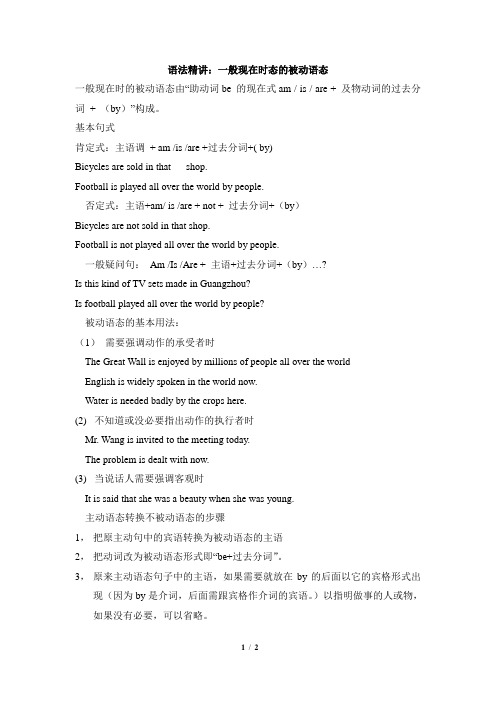
语法精讲:一般现在时态的被动语态一般现在时的被动语态由“助动词be 的现在式am / is / are + 及物动词的过去分词+ (by)”构成。
基本句式肯定式:主语调+ am /is /are +过去分词+( by)Bicycles are sold in that shop.Football is played all over the world by people.否定式:主语+am/ is /are + not + 过去分词+(by)Bicycles are not sold in that shop.Football is not played all over the world by people.一般疑问句:Am /Is /Are + 主语+过去分词+(by)…?Is this kind of TV sets made in Guangzhou?Is football played all over the world by people?被动语态的基本用法:(1)需要强调动作的承受者时The Great Wall is enjoyed by millions of people all over the worldEnglish is widely spoken in the world now.Water is needed badly by the crops here.(2)不知道或没必要指出动作的执行者时Mr. Wang is invited to the meeting today.The problem is dealt with now.(3)当说话人需要强调客观时It is said that she was a beauty when she was young.主动语态转换不被动语态的步骤1,把原主动句中的宾语转换为被动语态的主语2,把动词改为被动语态形式即“be+过去分词”。
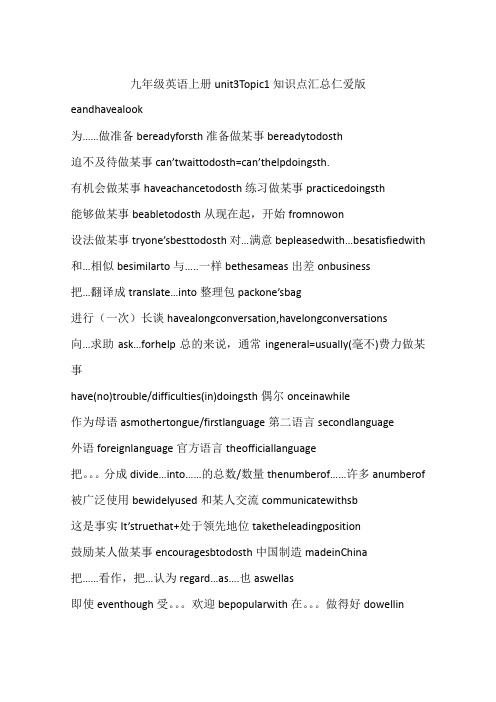
九年级英语上册unit3Topic1知识点汇总仁爱版eandhavealook为……做准备bereadyforsth准备做某事bereadytodosth迫不及待做某事can’twaittodosth=can’thelpdoingsth.有机会做某事haveachancetodosth练习做某事practicedoingsth能够做某事beabletodosth从现在起,开始fromnowon设法做某事tryone’sbesttodosth对…满意bepleasedwith…besatisfiedwith 和…相似besimilarto与…..一样bethesameas出差onbusiness把…翻译成translate…into整理包packone’sbag进行(一次)长谈havealongconversation,havelongconversations向…求助ask…forhelp总的来说,通常ingeneral=usually(毫不)费力做某事have(no)trouble/difficulties(in)doingsth偶尔onceinawhile作为母语asmothertongue/firstlanguage第二语言secondlanguage外语foreignlanguage官方语言theofficiallanguage把。
分成divide…into……的总数/数量thenumberof……许多anumberof 被广泛使用bewidelyused和某人交流communicatewithsb这是事实It’struethat+处于领先地位taketheleadingposition鼓励某人做某事encouragesbtodosth中国制造madeinChina把……看作,把…认为regard…as….也aswellas即使eventhough受。
欢迎bepopularwith在。
做得好dowellin一般现在时的被动语态英语语态有主动语态和被动语态两种。

Unit 3 Topic1 1 English is widely spoken throughout the world.一. 重点单词foreign —foreigner busy—business—businessman communicate—communicationimpossible—possible twin—twins lay—laid—laid speak—speaker Europe—European tour—tourist—tourism power--powerful lead—leading--leader二·词组。
stick sth on sp. 把。
贴在be ready for sth 为某事准备好了can’t wait to do sth 迫不及待做某事have a good chance to do sth 有一个好的机会去做某事throughout / all over the world 全世界from now on 从现在开始millions of 数以百万计的be pleased with 对。
感到满意pack one’s bags 打包行李on business 出差the night table 床头柜the official language 官方语言be similar to / be the same as / be different from和。
相似和。
一样和。
不一样have trouble/difficulty (in) doing sth 做某事有困难ask sb for help 向某人求助explain (sth) to sb 向某人解释某事get along with sb 与某人相处be in trouble 处于麻烦中divide into…把。
分成the largest number of people 最多数量的人mother tongue 母语the base language 基础语言international business 国际商业the world’s airlines 国际航空in many different fields of life 在生活的很多不同领域go abroad 出国play an important part in our lives 在我们生活中扮演重要角色a powerful country 一个强大的国家take the leading position in 在某方面处于领先地位encourage sb to do sth 鼓励某人做某事be popular with sb. 受某人的欢迎make great progress in doing sth 在某事上取得巨大的进步require sb to do sth 要求某人做某事in the rest of 在。
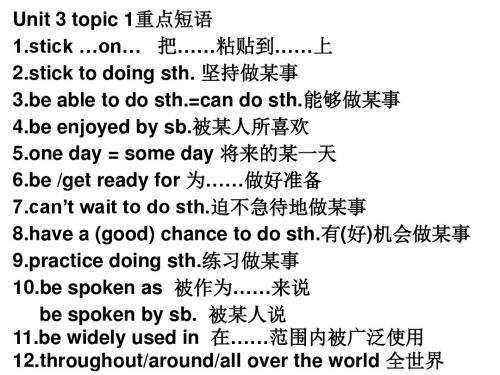

九年级英语上册unit3Tpi 1知识点汇总仁爱版九年级英语上册unit3Tpi1知识点汇总仁爱版九年级英语上册unit3-4知识点仁爱版Unit3Tpi1贴在墙上stisthntheall来看一看eandhaveal为……做准备bereadfrsth准备做某事bereadtdsth迫不及待做某事an’taittdsth=an’thelpdingsth有机会做某事haveahanetdsth练习做某事pratiedingsth能够做某事beabletdsth从现在起,开始frnn设法做某事trne’sbesttdsth对…满意bepleasedith…besatisfiedith和…相似besiilart与…一样bethesaeas出差nbusiness把…翻译成translate…int整理包pane’sbag进行(一次)长谈havealngnversatin, havelngnversatins向…求助as…frhelp总的来说,通常ingeneral=usuall费力做某事havetruble/diffiultiesdingsth偶尔neinahile作为母语asthertngue/firstlanguage第二语言sendlanguage外语freignlanguage官方语言theffiiallanguage把。
分成divide…int……的总数/数量thenuberf……许多anuberf被广泛使用beidelused和某人交流uniateithsb这是事实It’struethat+处于领先地位taetheleadingpsitin鼓励某人做某事enuragesbtdsth中国制造adeinhina把……看作,把…认为regard…as…也asellas即使eventhugh受。
欢迎beppularith在。
做得好dellin一般现在时的被动语态英语语态有主动语态和被动语态两种。
主语是动作的执行者,叫主动语态。

九上Unit 3 Topic 1 必背词句一、单词1.漫画cartoon 2人物character 3普通地widely 4遍及throughout 5外国人foreigner 6电影制作人film-maker 7停车房garage 8位置position 9在今晚tonight10西班牙语Spanish 11沟通communicate 12对话conversation 13口译员interpreter14解释explain 15不可能的impossible 16双胞胎之一twin 17划分divide18挖dig 19放置lay 20根源root 21买卖人trader 22出生地的native23发言人speaker 24外国的foreign 25根据base 26欧洲的European27王国kingdom 28旅游业tourism 29会议conference 30游客tourist31英国Britain 32强大的powerful 33最重要的leading二、短语(字体加粗且加下划线内容为课后单词表中的短语)1.从今往后from now on2.出差on business3.与…相似be similar to4.对…感到高兴be pleased with5.母语mother tongue6.把…分成divide...into7.在生活的不同领域in many different fields of life 8.与某人相处get along with sb.9.为…做准备be ready for 10.做某事有困难have trouble doing sth.11.被要求做某事be required to do sth. 12.被当做,被看作be regarded as13.占据领先地位take the leading position三、句子(字体加粗且打*内容为Section D 语法和功能句)*1.P55迪斯尼乐园被来自全世界无数的人们所喜欢。

仁爱版九年级英语上册 Unit 3 Topic 1 重难点知识归纳总结Topic 1 English is widely spoken throughout the world.【重点单词】1.cartoon /kɑːˈtuːn/ n. 漫画2.character /ˈkærəktə(r)/ n. (书、剧本、电影等中的)人物,角色;(汉)字;字体;品格3.widely /ˈwaɪdli/ adv. 普遍地;广范地4.throughout /θruːˈaʊt/ prep. 遍及;贯穿5.foreigner /ˈfɒrənə(r)/ n. 外国人6.film-maker 电影制作人7.garage /ˈgærɑ:ʒ/ n. 停车库;车库8.pack /pæk/ v. 把……打包n. 包,捆;(猎犬、野兽等的)一群9.tonight /təˈnaɪt/ adv. 在今晚10.Spanish /ˈspænɪʃ/ n. 西班牙语;adj. 西班牙人的;西班牙的;西班牙语的municate /kəˈmjuːnɪkeɪt/ v. 交流,沟通12.conversation /ˌkɒnvə'seɪʃ(ə)n/ n. 对话;谈话13.interpreter /ɪnˈtɜːprətə(r)/ n. 口译译员14.explain /ɪk'spleɪn/ v. 解释,说明15.impossible /ɪmˈpɒsəbl/ adj. 不可能存在的;不可能的16.twin /twɪ/ adj. 双胞胎之一的;n. 双胞胎之一17.divide /dɪˈvaɪd/ v. 分,划分18.dig /dɪɡ/ v. 掘(地),凿(洞),挖(土)y /leɪ/ v. 放置,安放,搁20.mother tongue 母语21.root /ruːt/ n. 起源,根源;根;词根22.trader /ˈtreɪdə(r)/ n. 商人,买卖人23.native /ˈneɪtɪv/ adj. 出生地的,当地的24.speaker /ˈspiːkə(r)/ n. 讲(某种语言) 的人,发言者25.foreign /ˈfɒrən/ adj. 外国的26.base /beɪs/ n. 根据;根基;总部;v. 以……为基础(或根据)27.European /ˌjʊərəˈpɪə/ adj. 欧洲的28.kingdom /ˈkɪŋdəm/ n. 王国;管辖范围;领域29.tourism /ˈtʊərɪzəm/ n. 旅游业;观光30.conference /ˈkɒnfərəns/ n. (正式的)会议;商谈31.tourist /ˈtʊərɪst/ n. 旅游者;游客32.Britain /ˈbrɪtn/ n. 英国;不列颠33.powerful /ˈpaʊəfl/ adj. 强大的;有权势的;有影响力的34.leading /'liːdɪŋ/ adj. 最重要的,最成功的35.position /pəˈzɪʃən/ n. 位置;方位【重点短语】1.be able to 能够;会2.can’t wait to do sth. 迫不急待地要做某事3.have a (good) chance to do sth. 有(好)机会做某事4.from now on 从今往后,从现在开始5.on business 出差6.be pleased with 对……感到高兴;满意于……7.divide..into.. 把……分成8.be similar to 和……相似9.have no/some trouble (in) doing sth. 做某事没有/有些困难10.ask sb. for help 向某人寻求帮助11.as well as 以及,和12.mother tongue 母语13.take the leading position 处于领先地位14.encourage sb. to do sth. 鼓励某人做某事15.make great progress in doing sth在做某事方面取得很大进展16.be regarded as 被认为是【重点句型】1.Disneyland is enjoyed by millions of people from all over the world.世界上数以百万的人们都喜欢迪斯尼乐园。

仁爱英语九年级上册知识点归纳Unit 1 The Changing WorldTopic3 The world has changed for better.一、重点短语1.on the phone 通过电话,在电话上2.have/has been in…某人在某地待了长时间3.get/be used to(doing) sth. 习惯于(做)某事ed to do sth. 过去常常做某事5.as a matter of fact/in fact事实上6.show sb. sth.=show sth. to sb.给某人展示某物7.homeless people 无家可归的人8.live a normal/happy/hard life 过着一种正常的/幸福的/艰苦的生活9.in need 在困难时,在贫困之中10.decide to dosth.决定做某事decide on sth. 决定某事make a decision 做决定11.offer sb.sth.=offer sth. to sb.给某人提供某物12.medical treatment 医疗救助13.provide sb.with sth.=provide sth. for sb.为某人提供某物14.feel good about oneself 自我感觉良好15.change for the better 变得更好16.get/be in trouble 陷入困境17.pick up 捡起,(用车)接(人或物)18.help sb. out 帮助某人摆脱困境19.the cause of 导致……的原因the result of ……的结果the reas on for ……的原因20.on purpose 故意21.have a problem with…有……问题22.think of… as…把……视为……23.raise one’s children抚养孩子24.afford sth. for sb. 为某人支付/担负某物 afford to do sth. 担负得起做某事25.make contributions to(doing)sth.在(做)某事方面做出贡献26.as a result 结果27.without th e help of…没有……的帮助lions of 数百万29.according to 据……所说,按……所报道30.plenty of 大量的二、单词转换1.visit v./n.参观,访问,游览 visitor n.参观者,来访者2.chemical adj.化工的,化学的 chemistry n.化学,化学物质3.homeless adj.无家的 homelessness n.无家可归4.treat v.对待,治疗 treatment n.疗法,治疗5.basic adj.基本的,基础的 base n.基础6.important adj.重要的 importance n.重要性,重要三、重点句型1.You have been in New York for a long time.你已经在纽约待了很长时间了。
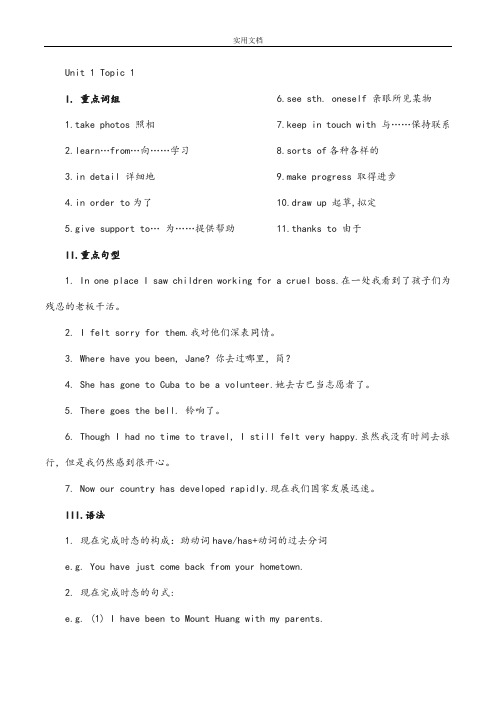
Unit 1 Topic 1I. 重点词组1.take photos 照相2.learn…from…向……学习3.in detail 详细地4.in order to为了5.give support to…为……提供帮助6.see sth. oneself 亲眼所见某物7.keep in touch with 与……保持联系8.sorts of各种各样的9.make progress 取得进步10.draw up 起草,拟定11.thanks to 由于II.重点句型1. In one place I saw children working for a cruel boss.在一处我看到了孩子们为残忍的老板干活。
2. I felt sorry for them.我对他们深表同情。
3. Where have you been, Jane? 你去过哪里,简?4. She has gone to Cuba to be a volunteer.她去古巴当志愿者了。
5. There goes the bell. 铃响了。
6. Though I had no time to travel, I still felt very happy.虽然我没有时间去旅行,但是我仍然感到很开心。
7. Now our country has developed rapidly.现在我们国家发展迅速。
III.语法1. 现在完成时态的构成:助动词have/has+动词的过去分词e.g. You have just come back from your hometown.2. 现在完成时态的句式:e.g. (1) I have been to Mount Huang with my parents.(2) I haven’t seen him for a long time.(3) Where have you been?(4) ——Have you ever cleaned a room? ——Yes, I have. / No, I haven’t.3. have/ has been与 have/has gone 的区别have/has been to sp.表示曾经到过某地—— have/has gone to sp.表示已经去了某地e.g. (1) I have been to Mount Huang with my parents. (2) She has gone to Cuba to be a volunteer.Unit 1 Topic 2I. 重点词组1. get lost 迷路2. each other 彼此3.at least 至少4take place发生5because of 因为6.be strict with sb. 对某人严格要求7.carry out 实行8.be short of 缺乏9.take measures to do sth.采取措施做某事10.be known as…作为……而著名11.work well in doing…在……方面起作用12.a couple of 一些13keep up with赶上,跟上II.重点句型1. Have you found him yet? 你已经找到他了吗?2. ——I really hate to go shopping. 我的确讨厌购物。
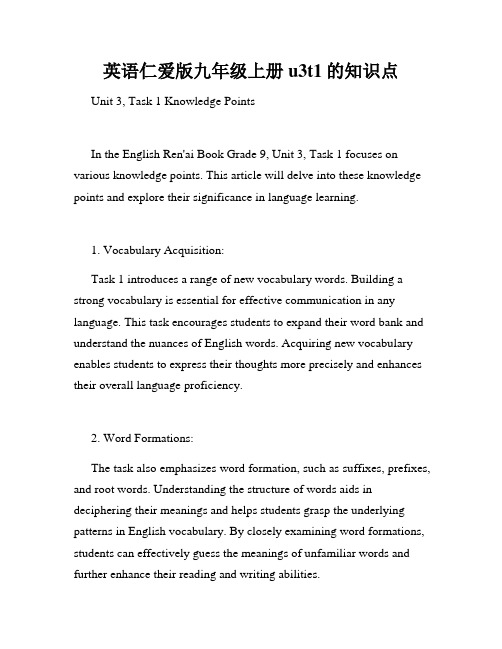
英语仁爱版九年级上册u3t1的知识点Unit 3, Task 1 Knowledge PointsIn the English Ren'ai Book Grade 9, Unit 3, Task 1 focuses on various knowledge points. This article will delve into these knowledge points and explore their significance in language learning.1. Vocabulary Acquisition:Task 1 introduces a range of new vocabulary words. Building a strong vocabulary is essential for effective communication in any language. This task encourages students to expand their word bank and understand the nuances of English words. Acquiring new vocabulary enables students to express their thoughts more precisely and enhances their overall language proficiency.2. Word Formations:The task also emphasizes word formation, such as suffixes, prefixes, and root words. Understanding the structure of words aids in deciphering their meanings and helps students grasp the underlying patterns in English vocabulary. By closely examining word formations, students can effectively guess the meanings of unfamiliar words and further enhance their reading and writing abilities.3. Synonyms and Antonyms:In Task 1, students are exposed to synonyms and antonyms. Exploring words with similar or opposite meanings helps students develop a more nuanced understanding of vocabulary. This knowledge allows for more effective communication as students can choose words based on their desired level of intensity or polarity.4. Contextual Clues:Understanding contextual clues is crucial for interpreting and comprehending written texts. Task 1 encourages students to identify the meaning of words based on the surrounding words, phrases, and sentences. This skill promotes independent reading and enables students to overcome unfamiliar vocabulary hindering their comprehension.5. Etymology:Task 1 introduces the concept of etymology, which explores the origins and historical development of words. Understanding etymology provides students with insights into the cultural and historical contexts in which words evolved. This knowledge deepens language understanding and connects students to the rich heritage of the English language.6. Sentence Construction:Aside from vocabulary, Task 1 focuses on sentence construction by providing examples that illustrate various grammatical structures. This component helps students improve their writing skills and demonstrates how different sentence structures convey different meanings. It also offers opportunities for students to practice forming meaningful sentences using the new vocabulary words.7. Reading Comprehension:The task includes short passages for students to read and comprehend. By engaging in reading comprehension exercises, students learn to extract information, make inferences, and draw conclusions. These skills are vital for successful language acquisition and overall academic success.Conclusion:Unit 3, Task 1 of the English Ren'ai Book Grade 9 introduces a variety of knowledge points that enhance students' vocabulary, language recognition, and overall language proficiency. Mastering these knowledge points equips students with the necessary skills to effectively communicate, write, and comprehend the English language.。

Unit 3 English around the worldTopic1 English is widely spoken throughout the world.一.重要句型:Section A1. You can stick it on the wall. 你可以把它贴在墙上。
(1)A. stick v. 粘贴,=put up;Please stick this map of China on the wall. 请把这幅中国地图贴在墙上。
B. ① stick to 坚持,坚守(某种观点、主张、理想、真理、协议)+ v.ing;He always stick to his own decision. 他总是坚持自己的决定。
② stick to doing sth. 坚持做某事;He sticks to speaking English everyday. 他坚持每天讲英语。
C.stick n. 木棍(棒),枝条;walking stick 手杖,拐杖;eg: You can stick it on the wall in your room.你可以把它贴在你房间的墙上。
2.Disneyland is enjoyed by millions of people from all over the world.世界上数以百万的人们都喜欢迪斯尼乐园。
此句是一般现在时的被动语态,被动语态表示主语是谓语动词的承受者,其结构:助动词am, is , are+及物动词的过去分词。
动作的执行者由by引出的短语表示,by 意为“被……,由…….”。
English is spoken by many people. 许多人讲英语。
3. I hope I can go there one day. 希望有一天我也能去那儿。
A. one day 既表示“将来的有一天”,也可以表示“过去曾经有一天”。
One day, he met an old friend. 一天,他遇见了一位老朋友。
九年级英语上册unit3Topic 1知识点汇
总仁爱版
九年级英语上册unit3Topic1知识点汇总仁爱版
九年级英语上册unit3-4知识点仁爱版
Unit3Topic1
贴在墙上
sticksthonthewall
来看一看comeandhavealook
为……做准备bereadyforsth
准备做某事bereadytodosth
迫不及待做某事
can’twaittodosth=can’thelpdoingsth.
有机会做某事
haveachancetodosth
练习做某事
practicedoingsth
能够做某事
beabletodosth
从现在起,开始fromnowon
设法做某事tryone’sbesttodosth
对…满意bepleasedwith…
besatisfiedwith
和…相似
besimilarto与…..一样bethesameas
出差
onbusiness
把…翻译成
translate…into
整理包packone’sbag
进行(一次)长谈havealongconversation, havelongconversations
向…求助
ask…forhelp
总的来说,通常ingeneral=usually费力做某事havetrouble/difficultiesdoingsth
偶尔
onceinawhile
作为母语
asmothertongue/firstlanguage
第二语言
secondlanguage
外语
foreignlanguage
官方语言
theofficiallanguage
把。
分成
divide…into
……的总数/数量thenumberof……许多anumberof
被广泛使用
bewidelyused
和某人交流
communicatewithsb
这是事实It’struethat+
处于领先地位
taketheleadingposition
鼓励某人做某事
encouragesbtodosth
中国制造
madeinchina
把……看作,把…认为regard…as….
也aswellas
即使eventhough
受。
欢迎bepopularwith
在。
做得好dowellin
一般现在时的被动语态
英语语态有主动语态和被动语态两种。
主语是动作的执
行者,叫主动语态。
如:wecleantheclassroom.我们打扫教室。
主语是动作的承受者,叫被动语态。
如:Theclassroomiscleaned.教室被(我们)打扫。
.
被动语态的构成:助动词be+及物动词的过去分词+(by+宾语)
其中by意为“被……;由……”,表动作的执行者。
如:Theglassisbrokenbythatboy.玻璃杯是那个男孩打破的。
be有人称、数和时态的变化,其肯定式、否定式、疑问式的变化规则与be作为连系动词时完全一样。
如:Englishiswidelyspokenaroundtheworld.(肯定式)Englishisnotwidelyspokenaroundtheworld.(否定式)IsEnglishwidelyspokenaroundtheworld?(疑问式)
yes,itis./No,itisn’t.
2.
被动语态的用法:
(1)在没有指明动作的执行者或者不知道动作执行者的情况下,可用被动语态。
如:Thiscoatismadeofcotton.这件大衣是棉制的。
(2)要强调动作的承受者而不是执行者时,用被动语态。
如:Herbikeisstolen.她的自行车被偷了。
3.
主、被动语态的转换:
主动语态:主语+及物动词谓语动词+宾语(+其它)
被动语态:主语+be+及物动词的过去分词+by+宾语(+其它)
注意:(1)主动、被动互转时,时态不变。
(2)主动句的主语是代词的主格形式,变成被动态by的宾语时,要用宾格形式。
如:
Peoplegrowriceinthesouth.
Riceisgrowninthesouth.
Shetakescareofthebaby.
Thebabyistakencareof.
交际用语:谈论英语的广泛使用
.---you’llhaveagoodchancetopracticespeakingEnglishthere.
---you’reright.
2.---ButI’mnotgoodatEnglish.I’malittleafraid.
---Don’tworry.
3.---IsSpanishsimilartoEnglish?
---Notreally.。